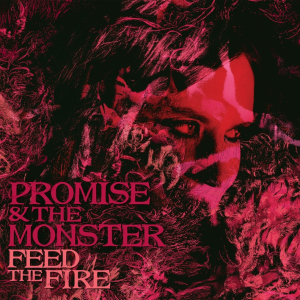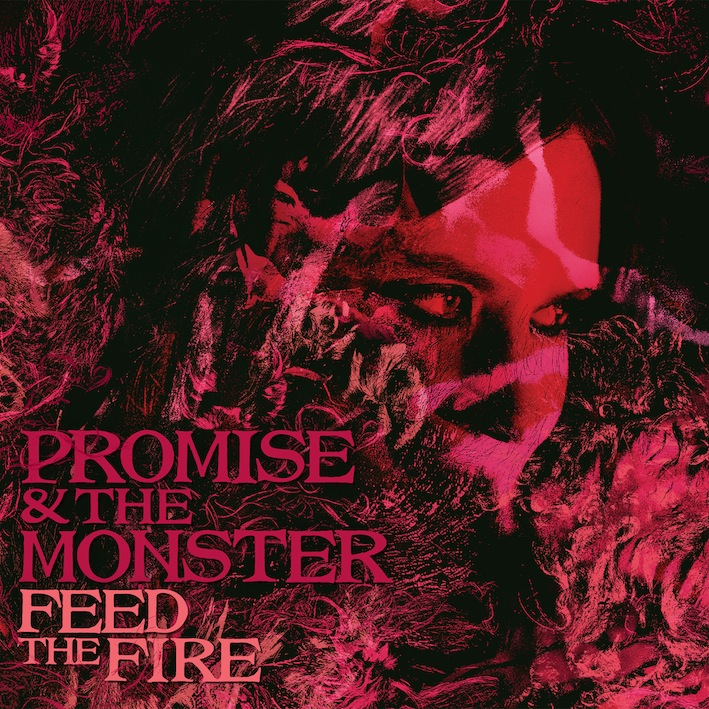
“To see, listen and feel is quite a violent and confusing experience,”, claims Billie Lindahl unsurprisingly on the press release launching the Swede’s latest album. The Stockholmer behind Promise And The Monster has already given audiences a sensory experience – usually cold, insecure 4D goosebumps – on her two previous albums Transparent Knives and Red Tide. The multi-instrumentalist’s first album in four years, Feed The Fire takes this Scandinavian skill of tangibility to another level; a level that burns rather than freezes the senses of her allegiance.
Firstly, Lindahl continues to possess this enchanting siren; a magnetic apparition in the darkness. The element of squeaky innocence in her voice made it comparable, at her career’s dawn, to Stina Nordenstam and Joanna Newsom, but it has matured into its own stand-alone charm. The tone is so mesmerising that it doesn’t need to be accompanied by words to be effective; which is advantageous considering she still suffers from moments of incomprehensibility, and her Soley-like surrealism towards folk – which pairs reality with fiction – could be too cryptic for some.
The best example of this non-lexical power is on the paradisal ‘Julingvallen‘ – a blissful intermission that could have fit on last year’s Love Songs For Robots by Patrick Watson. Aided by soft breezes of air, wind chimes and ambient acoustics, Lindahl’s ethereal humming is supposed to transport listeners to her “safe place” – a magical hill in Sweden named Julingvallen that provides a secure haven to the fearful. Noting the fact that it doesn’t exist on Google Maps but has been photographed makes it all the more otherworldly; the sound of heaven. Tactically positioned in the middle portion of Feed The Fire, ‘Julingvallen’ is a non-flammable cocoon in between fiery flames blazing out destructive helplessness; switching from different perspectives of torment: the victim (‘Hunter’), the observer (‘Feed The Fire’) and the executioner (‘Slow and Quiet’ – imagine if Daniel Knox soundtracked the film Maniac).
Whether it’s evocative images of apocalyptic landscapes – aided by frequent mentions of “blood”, sinister actions and decaying nature – or emotional psychosis, it’s a nightmarish universe where Lindahl’s state of mind seeks glowing exit signs. Lindahl even blackens The Zombies classic ‘Time of The Season’, bringing it into the colour of her trauma. From an anthem that highlighted the positive freedom of free love to a warning about romantic recklessness. Speaking from her personal experience, the result of her hasty actions was an endless cycle of bad partners.
Repetition is something that critics accused Promise & The Monster of on her debut album with her style rigid to melancholic acoustic folk. Feed The Fire is her boldest in composition, especially as Lindahl and producer Love Martinsen ambitiously aimed to create a sound that combined the cowboy twang of Lee Hazlewood and Nico‘s minimal wave record Carmen Obscura – continuing from Lindahl’s tribute to Nico on predecessor Red Tide. The former is demonstrated in the country blues vibratos and slow Duane Eddy rockabilly that subtlety lie in the album’s foundations. At the same time, nods to the latter is heard in the tribal drums, inventive and precise percussion (including Lindahl’s favourite autoharp and glockenspiel) and mysterious allure. All of this exemplifying Promise And The Monster acknowledgement and respect for decades-past music.
There’s plenty of fuel, oxygen and heat in Feed The Fire to keep the new album from Bella Union’s latest recruit ignited as a long-player.
[Rating:4]




